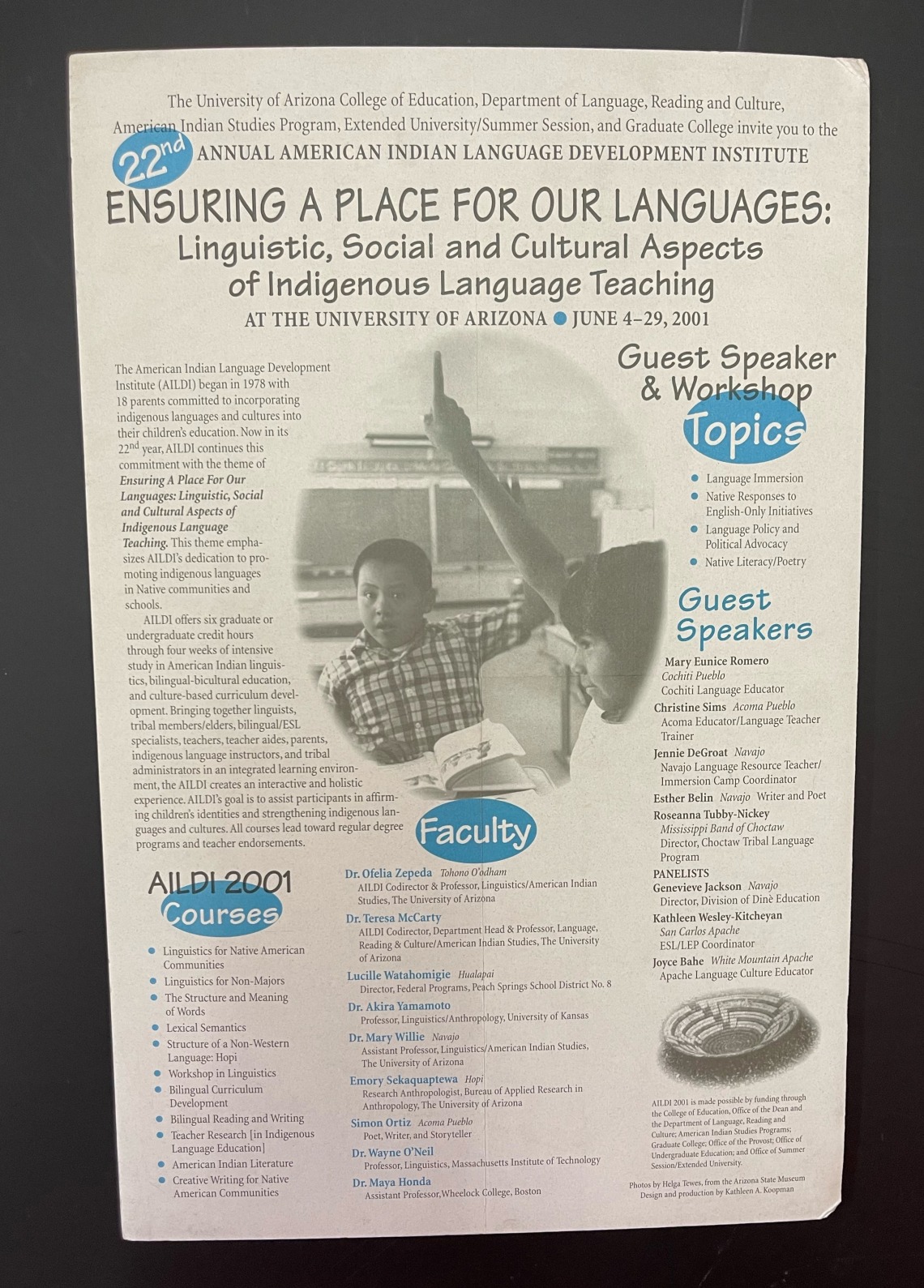
The University of Arizona College of Education, Department of Language, Reading and Culture, American Indian Studies Program, Extended University/Summer Session, and Graduate College invite you to the
22nd ANNUAL AMERICAN INDIAN LANGUAGE DEVELOPMENT INSTITUTE
ENSURING A PLACE FOR OUR LANGUAGES: Linguistic, Social and Cultural Aspects of Indigenous Language Teaching
AT THE UNIVERSITY OF ARIZONA • JUNE 4-29, 2001
The American Indian Language Development Institute (AILDI) began in 1978 with 18 parents committed to incorporating indigenous languages and cultures into their children's education. Now in its 22nd year, AILDI continues this commitment with the theme of Ensuring A Place For Our Languages: Linguistic, Social and Cultural Aspects of Indigenous Language Teaching. This theme emphasizes AILDIs dedication to promoting indigenous languages in Native communities and schools.
AILDI offers six graduate or undergraduate credit hours through four weeks of intensive study in American Indian linguistics, bilingual-bicultural education, and culture-based curriculum development. Bringing together linguists, tribal members/elders, bilingual/ESL specialists, teachers, teacher aides, parents, indigenous language instructors, and tribal administrators in an integrated learning environment, the AILDI creates an interactive and holistic experience. AILDI's goal is to assist participants in affirming children's identities and strengthening indigenous languages and cultures. All courses lead toward regular degree programs and teacher endorsements.
AILDI 2001 Courses
- Linguistics for Native American Communities
- Linguistics for Non-Majors
- The Structure and Meaning of Words
- Lexical Semantics
- Structure of a Non-Western Language: Hopi
- Workshop in Linguistics
- Bilingual Curriculum Development
- Bilingual Reading and Writing
- Teacher Research [in Indigenous Language Education]
- American Indian Literature
- Creative Writing for Native American Communities
Faculty
- Dr. Ofelia Zepeda, Tohono O’odham
- AILDI Codirector & Professor, Linguistics/American Indian Studies, The University of Arizona
- Dr. Teresa McCarty
- AILDI Codirector, Department Head & Professor, Language, Reading & Culture/American Indian Studies, The University of Arizona
- Lucille Watahomigie, Hualapai
- Director, Federal Programs, Peach Springs School District No. 8
- Dr. Akira Yamamoto
- Professor, Linguistics/Anthropology, University of Kansas
- Dr. Mary Willie, Navajo
- Assistant Professor, Linguistics/American Indian Studies, The University of Arizona
- Simon Ortiz, Acoma Pueblo
- Poet, Writer, and Storyteller
- Dr. Wayne O’Neil
- Professor, Linguistics, Massachusetts Institute of Technology
- Dr. Maya Honda
- Assistant Professor, Wheelock College, Boston
Guest Speaker & Workshop Topics
- Language Immersion
- Native Responses to English-Only Initiatives
- Language Policy and Political Advocacy
- Native Literacy/Poetry
Guest Speakers
- Mary Eunice Romero, Cochiti Pueblo
- Cochiti Language Educator
- Christine Sims, Acoma Pueblo
- Acoma Educator/Language Teacher Trainer
- Jennie DeGroat, Navajo
- Navajo Language Resource Teacher/Immersion Camp Coordinator
- Esther Belin, Navajo
- Writer and Poet
- Rosanna Tubby-Nickey
- Mississippi Band of Choctaw Director, Choctaw Tribal Language Program
PANELISTS
- Genevieve Jackson, Navajo
- Director, Division of Dinè Education
- Kathleen Wesley-Kitcheyan, San Carlos Apache
- ESL/LEP Coordinator
- Joyce Bahe, White Mountain Apache
- Apache Language Culture Educator
AILDI 2011 is made possible by funding through the College of Education, Office of the Dean and the Department of Language, Reading, and Culture; American Indian Studies Programs; Graduate College; Office of the Provost; Office of Summer Session/Extended University
Photos by Helga Tewes, from the Arizona State Museum
Design and production by Kathleen A. Koopman

